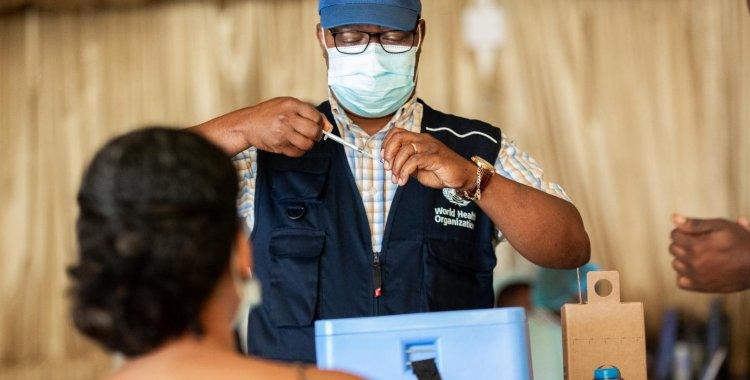At a press conference, the Secretary of State for Public Health, Carlos Alberto Pinto, said that Angola welcomes the WHO declaration, “which means a victory for health professionals, the scientific community and all other actors, with emphasis on the entire population that consented to countless sacrifices”.
Carlos Alberto Pinto said that vaccination has been a crucial element for controlling the emergency phase of the pandemic globally to date.
“Therefore, it will continue to promote vaccination against covid-19 in the country as a primary strategy for controlling the disease to save lives, lower the number of serious cases and deaths that are still being registered in the country”, said the Secretary of State to to Public Health.
The minister underlined that, currently, vaccination coverage in Angola is 47 percent with at least two doses, stressing that for it to be effective in herd immunity it must, according to the WHO, be above 85 percent, "being this the challenge of the country in which all are called to participate”.
“Mistério da Saúde will adapt the country’s contingency plan to the WHO’s long-term management plan for covid-19 2023-2025, in which it will adopt additional recommendations for this transition phase to the current measures according to the epidemiological situation. and the country's vaccination coverage”, he stressed.
In this sense, Carlos Alberto Pinto appealed, “once again, to the population to adhere to vaccination, as it saves lives and allows the WHO to reduce the level of alert”.
Angola notified the first two cases of covid-19 on March 21, 2020, having registered 105,669 cases and 1936 deaths until May 5 of this year, having gone through four waves caused by variants of global concern.
Carlos Alberto Pinto praised the national health system for having withstood the pressure of demand, "without ever collapsing, guaranteeing the continuity of the provision of health services to the population".
On March 2, 2021, Angola incorporated the implementation of the Vaccination Plan, "which was crucial for the considered successful management of the pandemic in terms of the number of serious cases and deaths", said Carlos Alberto Pinto.
“In view of this history, the Ministry of Health takes good note of the alerts of the director general of WHO in his statement regarding caution and prudence in dealing with this news”, he noted, stressing that the process of transition from emergency to the phase of control of covid-19 is already underway.
The process includes some measures, such as the integration of the vaccine against covid-19 into the routine vaccine, that is, the entire population over 12 years old must have at least two doses; strengthening of epidemiological surveillance, which means testing suspected cases and contacts and mandatory notification of all positive cases and deaths, as well as presenting the vaccination certificate when entering or leaving the country, or, failing that, the negative covid-19 test.
In turn, the WHO representative in Angola, Djamila Cabral, underlined that "the covid-19 pandemic is not over, what diminished was the alert" that the world faced.
“We appeal to the Ministry of Health to integrate covid-19 activities, namely surveillance and response into routine health programs and we maintain our commitment to continue supporting the country to achieve the best levels of vaccination coverage”, she said. .
According to Djamila Cabral, the WHO will also establish a review committee to develop long-term recommendations for the management of covid-19.
The director-general of the World Health Organization (WHO) declared on Friday the end of the health emergency for the covid-19 at a global level, accepting the recommendation of the emergency committee.
“Over the last year, the emergency committee and WHO have been analyzing the data carefully, considering when would be the right time to lower the alarm level. Yesterday, the emergency committee met for the 15th time and recommended that I declare an end to the global emergency. I took that advice,” said Tedros Adhanom Ghebreyesus at a press conference.
According to him, the lifting of the global public health emergency (PHEIC, its acronym in English), the highest level of alert that can be enacted by the organization, “does not mean that covid-19 has ended as a health threat”.







